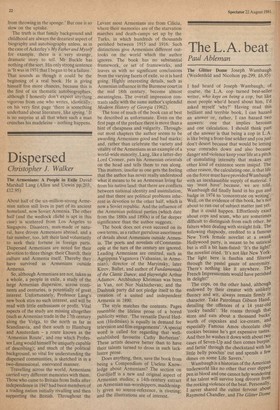Anecdotage
Duncan Fallo well
The Most Upsetting Woman Richard Buckle (Collins pp.288, £8.95) Oh, what it must be to come from an interesting family! This is the story of Richard Buckle's (the ex-ballet critic). 'Both Mike and Jane Woodger got engaged. Mary Graham too. Mary's youngest brother Martin had won a scholarship to Glenalmond, and Stephen was going to Sandhurst, hoping to join the Black Watch. John Graham left Cambridge for Ely Theological College in August. Judith was back from the Argentine, but had broken her leg. This was an excuse for Lily to . .
Lily was Mr Buckle's grandmother, 'the Most Upsetting Woman' of the title, whose letters— 'Dear Dolly, What a brick you are!' — form the basis of this first volume of autobiography and clog its pages throughout. Why she should be called 'the most upsetting' is rather a mystery since on the whole she appears to be a sweet old provincial nonentity. Why would anyone want to build a book around her?
Because he was brought up in a bungalow in Norfolk, Richard Buckle would hate you to think he was muck. . . Lorenzo de' Medici, who I did not know to be my ancestor . . . 'Or if you missed that — 'My great-great-great-great grandmother Elizabeth Berkeley, Lady Craven, later Margravine of Anspach . . . ' God-parents count too, don't they? 'My mother's godfather, Prince Edward of Saxe-Weimar, married to a Gordon-Lennox, was the grandson of the Grand Duke of Weimar whom Goethe served.'
All this sort of thing gave the Buckle family a keen historical awareness. But 'our interest in the affairs of King Edward VIII prevented us from noticing that Hitler had re-occupied the Rhineland.' Damn. And the rest was history . . .
At school (second generation Marlborough and proud of it), the author says he was 'brilliant, but lazy.' Brilliant? 'I began to paint in oils and, in the course of time, underwent the influence of Van Gogh.' The influence of Douglas Byng was quite strong too, and the young Buckle was beaten for getting into drag.
At Oxford, 'I played Rosencrantz, mincing outrageously.' The ballet-critic-to-be was sent down after a year for general thickness.
At the Regent Street Polytechnic. . . but 'my designs were too unusual.'
Paris. 'It was hopeless.'
So it had been downhill all the way, ever since the Margravine in fact. But like so many men of his generation he is saved by the war. Being shot at gave him a sudden sense of reality. Let me hand over to Lily. 'Dearest Dick, You must feel quite used to life in the barracks now . . . ' Sorry, that was a mistake. But the Army, yes, at last, he is not beaten for getting into drag. The Italian Campaign. The inevitable War Diary, extracts from which 'illustrate as well as anything in Tolstoy's War and Peace the confusion of battle . . .' The affinity with Tolstoy went clean over my head but it's good for a name check in the index. Tolstoy, Leo, Count.
If you can't be great, at least you can walk with the great. '6 August 1944. Tennyson's birthday and mine. Orlando gives me a leather pocket book with his card and a sprig of sweet-smelling herb.' And in the index — Tennyson, Alfred, 1st Baron. Mr Buckle is excited by any sort of title. He should be extremely thankful that he never had one of his own. He would have been worse than Robin Maugham, who, if you contradicted him after a few drinks, would foam at the mouth and say 'How dare you speak to me like that! I am the Viscount Maugham!'
And if you can't walk with the great, you can sometimes have tea with them. 'Henry of Bavaria had taken me to tea with Berenson.' Of Berenson Mr Buckle has nothing further to say — he is index fodder only. But it doesn't matter because the purpose of a sentence such as this is to impress upon the reader that Henry of Bavaria was a friend. Mr Buckle's pursuit of gentility is like a plant's pursuit of light. It is pathological.
The book ends after the war with Lily's death in 1949 and her husband's in 1952. Her moment of glory had been in beginning a letter 'Beechwood, 14 July 1934. I have been bowled out beyond anything since 1918 by Christian suddenly telling us that she wanted to go into the convent at Wantage . . . ' Apart from this she was a grind. One might have guessed from the Apologia wherein, of someone called David Dougill, the author writes 'his interest in my material perhaps saved me from throwing in the sponge.' But one is so slow on the uptake.
The truth is that family background and childhood are always the dreariest aspect of biography and autobiography unless, as in the case of Ackerley's My Father and Myself for example, there is a very strange, dramatic story to tell. Mr Buckle has nothing of the sort. His only strong sentence is 'It was in 1931 that I began to be a failure.' That sounds as though it could be the beginning of a real book. He is giving himself five more chances, because this is the first of six thematic autobiographies, although I honestly don't expect anything vigorous from one who writes, idiotically, on his very first page 'there is something underhand about literature, like spying.' It is no surprise at all that when such a man crunches his madeleine — nothing happens. A printing error in last week's issue resulted in the dropping of George McGovern's name from the second paragraph of Kenneth 0. Morgan's review of the Galbraith Memoirs. We apologise for this omission.



































 Previous page
Previous page